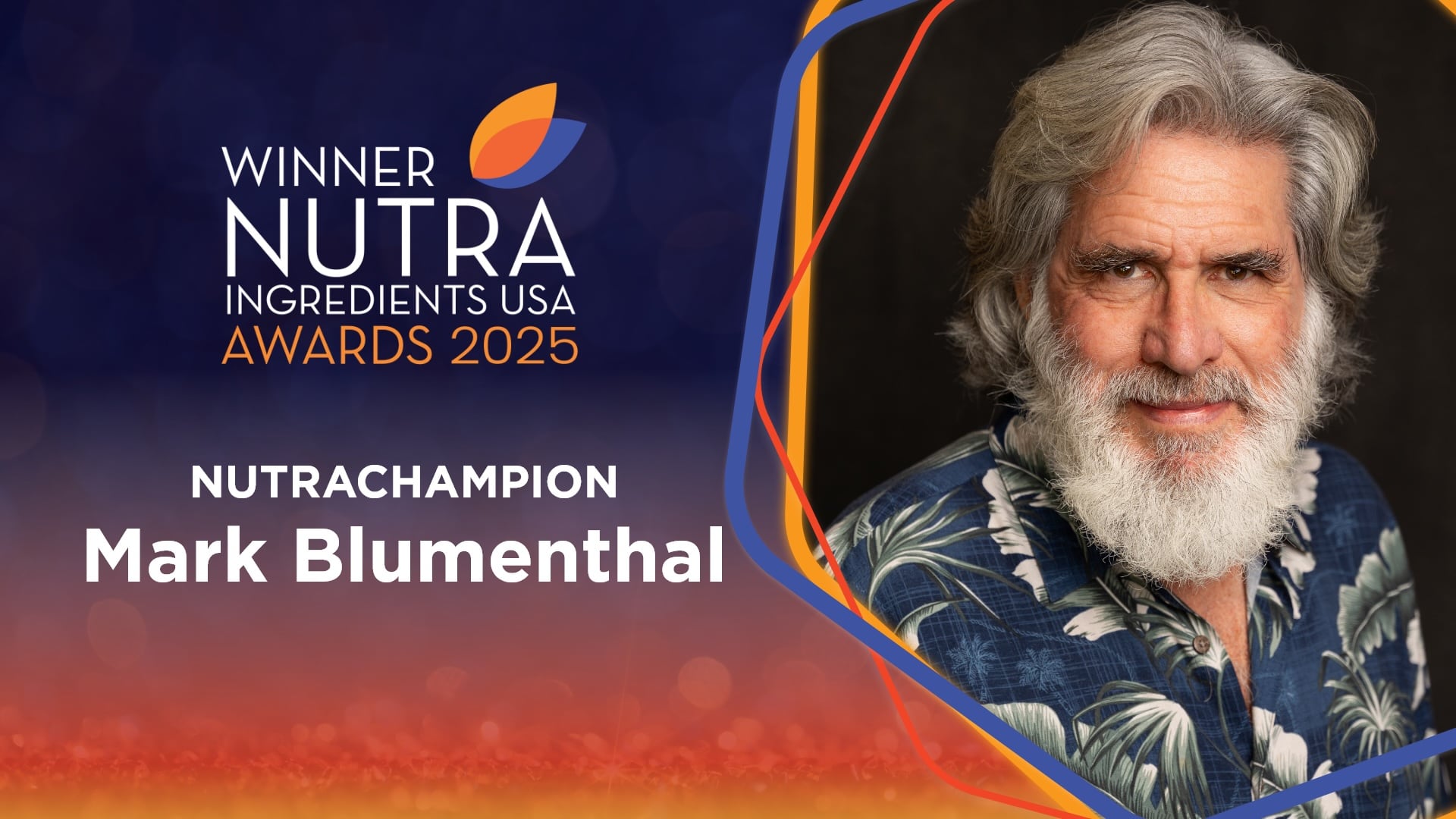As founder and executive director of the American Botanical Council (ABC), he has built a non-profit grounded in the values of service and gratitude that is today supported by thousands of members across the world.
“On behalf of all of us here at ABC, I gratefully accept your recognition of our work to increase personal and public health via the responsible use of herbs, medicinal plants, essential oils, beneficial fungi and other natural products used for health purposes, as covered by ABC’s nonprofit science-based research and educational mission,” Blumenthal said following the awards ceremony in Chicago last week.

Becoming the herbal cowboy
A long-time resident of Austin, TX, Blumenthal grew up in El Paso where his forebearers established The Popular Dry Goods Company in 1902, the largest locally owned department store in the El Paso Southwest. His family was also dedicated to service, founding the El Paso Lighthouse for the Blind, the Visiting Nurses Association and Drive-a-Meal.
In May of 1968 as he was graduating from the University of Texas with a degree in political science, Blumenthal became a vegetarian—not for economic, environmental or health reasons but as war protest and statement against killing. A subsequent search for information about vegetarianism led him to discover health food stores and not long after to a commune in New Mexico called Tree Frog.
By 1974, he was wholesaling ginseng and eventually other herbs through his Sweethardt Herbs company. One of his first suppliers was East Earth Herbs founded and operated by Peggy and Bill Brevoort out of a trailer in the Oregon woods. Blumenthal placed his orders for imported Chinese ginseng with them through a ship-to-shore radiophone line.
“I recall sitting poolside with him in our dripping bathing suits at the Las Vegas Hilton at an early National Nutritional Foods Association show while he outlined his vision of the American Botanical Council: ‘ABC, herbs should be as simple as that!’,” Peggy Brevoort said. “He saw a needed service to support the burgeoning herbal products industry and has now served it well for at least 50 years. He never wavered from his passion to create new programs, explore new areas and stay true to his principles.”

In 1980, Blumenthal introduced essential oils to the health food industry in little blue bottles under the name Flower Valley—the English translation of the German “Blumen” and “Tal”. Each was packaged with an instruction booklet detailing appropriate indications for use. Other notable launches followed, including MintSeng-branded ginseng mints and HotChaCha! salt-free salsa picante. He also bottled and distributed the Ginseng Rush natural soft drink.
It was during this time that Blumenthal became known as the ‘Herbal Cowboy’, a recognition of his entrenchment and dedication to the herbal industry, as well as his Texas roots.
“For those that know him, which is just about everyone in the herbal community, he’s the original herbal cowboy, the real McCoy,” said Rick Kingston, PharmD, co-founder of SafetyCall International and former ABC board member and chair. “No false pretenses, no shirt and tie (I don’t think he owns one), just an honest, loving man who so deserves this prestigious NutraIngredients award as this year’s Nutra Champion. We love you, Mark!”

In a 2006 interview with Whole Foods Magazine, Blumenthal’s life partner Jacquelyn Small, whom he met at a workshop retreat in 1976, described him as one of the founders of the herbal, medicinal and nutritional movement of the 1970s.
“He was the one who brought bulk herbs into the mom-and-pop natural food stores, carefully monitoring what came from other countries to make sure of their safety,” she said. “He introduced much of the Western world to ginseng, to much of ayurvedic healing, and was one of the first communicators to the Food and Drug Administration (FDA) about the regulation and political/educational aspects of the herbal industry.”
Preserving the beauty, lore and reputation of plants
While product launches satisfied his entrepreneurial spirit, Blumenthal could see that the revival of the herbal medicine movement in the United States needed to be propped up to fend off the antagonism and skepticism of the medical establishment, policy makers and regulators towards herbalists, naturopaths and marketers of medicinal herbs.
In 1983, he published the first HerbalGram, conceived as a Scientific American of herbs that would deliver engaging, authoritative and digestible science, industry and conservation news to systematically educate both industry and naysayers on the safe and responsible use of herbs. In the early years, Brevoort recollected that it was complemented by VerbalGram, an annual spoof sheet digging at various members and projects of the young herbal industry.
Today, HerbalGram is a glossy, peer-reviewed quarterly with a digital archive that documents the rich history of herbal traditions and traces the evolution of the modern medicinal plant movement. It recently celebrated its 40th anniversary and serves as the official publication of ABC, which Blumenthal founded in 1988 with ethnobotanist James Duke and pharmacognosists Norman Farnsworth and Varro Tyler. If he were to express pride about anything, which he prefers not to, Blumenthal said that co-founding ABC with these three venerated members of the herbal community would be it.

The organization’s educational scope has expanded over the years to encompass HerbClip scientific reviews, HerbTV videos, Botanical Adulterants Prevention Program (BAPP) Bulletins and the Adopt-an-Herb program with its HerbMedPro database.
“The point is we’re constantly showing people the beauty of plants, the history of plants, the lore of plants and how plants and people work together because plants are what makes our lives allowable on this planet,” Blumenthal said, reflecting on the work of ABC at the 2023 United Natural Products Alliance (UNPA) Members’ Retreat in Kona, Hawaii.

Medicinal plant and conservation expert Josef Brinckmann, president of ABC’s Board of Trustees and a contributing editor to HerbalGram, said it would be difficult to name someone who has a greater public impact than Blumenthal in developing effective media to communicate credible scientific information supporting the responsible use of botanicals.
“Although I had interacted with Mark since 45 years ago when his company Sweethardt Herbs was a distributor of Traditional Medicinals herbal teas, it wasn’t until the summer of 1983, after reading the first issue of HerbalGram, that I knew he was working on the big important stuff, such as legal access to safe and effective herbal medicines (which was under serious threat in the 1980s).”
Brinckmann is also the author of the new Botanical Environmental Education Resources Report (BEERR), a curated selection of global conservation and sustainability news coordinated with the launch of ABC’s Botanical Conservation, Sustainability and Regeneration (Botanical CSR) platform.
A people connector with a ‘rare disease’
Throughout his active career, Blumenthal has left his imprint on most corners of the herbal and dietary supplement industry and its people—attending countless conferences and shows, teaching medicinal chemistry at his alma mater, authoring and editing hundreds of publications and advocating for conscientious industry through initiatives including the former Herb Trade Organization, Herb Research Foundation (HRF) and most recently the ABC-AHP-NCNPR Botanical Adulterants Prevention Program. He is easily spotted thanks to his trademark flowered shirts and luxuriant head of hair.
Loren Israelsen, founder and president of UNPA, remembers encountering Blumenthal at Expo West in 1982 at a meeting about founding a new trade organization and who should run it. Israelsen had recently joined Nature’s Way as general counsel, and this was his first trade show.
“Suit jacket tucked into my pants and no idea what I was doing,” he said. “Mark came up and introduced himself as the Herbal Cowboy and asked me how to spell the Latin name of the California poppy (I invite readers to go see for themselves how hard that would be). I totally failed, but no matter. I had a sense we were going to be friends.”
While Israelsen was at Nature’s Way, the company had big plans to bring European phytomedicines to the United States, a project that aligned with Blumenthal’s big plans for ABC.
Although each went on to found his respective organization, Israelsen and Blumenthal are both founding members of SMQAA, a quality assurance alliance born on the eve of the passage of the Dietary Supplement Health and Education Act (DSHEA) at the Lord Baltimore Hotel.
“We decided we needed fewer business meetings and more personal hangouts,” Israelsen said. “At the end of our meal, we asked for four different single malts with straws (apologies, SMQAAians), and that was the birth of a new chapter of my friendship with Mark as well as one of the finest gatherings of friends in the industry.”
Ethnobotanist Thomas Brendler, founder of consultancy Plantaphile, first crossed paths with Blumenthal in connection with the translation of The Complete German Commission E Monographs—Therapeutic Guide to Herbal Medicine some 30 years ago. Blumenthal was the senior editor on the project, and Brendler was a couple of years into his career in the natural products industry. These monographs scientifically assessed the safety and efficacy of herbs used in traditional, folk and herbal medicine in Germany to inform rational use and what government-approved benefits can be printed on label.
“We kept bumping into each other at meetings of the Society for Economic Botany (now the Society for Ethnobotany),” Brendler said. “We have collaborated on countless projects since, carried by a deep sense of appreciation of his knowledge, wisdom, charisma and, last but not least, his humor. It is an honor to call him a friend.”
Beth Lambert, CEO of herbal supplement manufacturer Herbalist & Alchemist, noted Blumenthal’s knack for finding people who are outstanding in their fields and showcasing them through HerbalGram and the annual ABC awards. She highlighted ABC’s preservation of the late botanist Steven Foster’s library of herbal photography and knowledge as prime example. The collection includes over 150,000 visually striking photographs of over 1,700 accurately identified medicinal and aromatic plant species from around the world, although his photos and articles had graced the pages of HerbalGram issues since 1991.

“Mark is good at connecting people,” Lambert added. “He makes it his business to know everyone in the industry. He wants to know what their passion is, what kind of contribution they can make to the industry and will bring that out one way or another.”
It helps that Blumenthal remembers the slightest details about those he has befriended across industry and decades and that he is a firm believer in thank you notes, well wishes and gifting night lights to children.
“As everyone knows, if you met Mark once, it is difficult to forget this character, but he will always remember you, and most of the time, you will bond with him,” said Ikhlas Khan, director of the National Center for Natural Product Research (NCNPR) at the University of Mississippi, who met Blumenthal at an American Society of Pharmacognosy interim meeting in 1999.
“He carries a disease which is rare, called photogenic memory. He does utilize it very well to promote herbs and also friendships, like calling on birthdays. No one is perfect, but Mark leaves his mark on each and every one of us in a good way. His contributions are tremendous, and the way he involves community is unique.”



